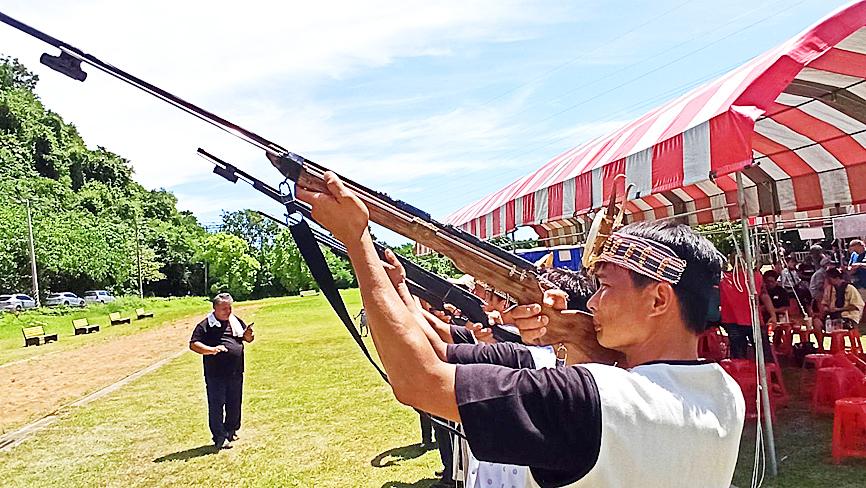Sioulin Township’s (秀林) Truku People’s Hunting Association yesterday awarded 294 hunter certificates to Aborigines of Hualien County, a first step toward self-managed hunting by local Aboriginal villages.
The event might bolster Aborigines’ appeal to the central government to allow more villages to participate in non-commercial hunting, the association said.
After a 2017 project run by the Forestry Bureau’s Hualien Forest District Office helped hunting groups from Tongmen Village (銅門), the groups — from nine townships and 16 villages in Sioulin Township — banded together to form the association.

Photo: Wang Chin-yi, Taipei Times
Yesterday, after overseeing a traditional ceremony of village representatives firing their rifles into the air and lighting smoke bombs, Wenlan Village (文蘭) elder Lowsi Rakaw and association director-general Teyra Yudaw handed out the certificates.
The association follows traditional hunting rules, passes on hunting skills and experience to the next generation, and works with academics and government officials on the sustainability of the natural environment, Yudaw said.
The association’s certificate entails a 20-hour course on topics such as hunting culture, hunter safety, and laws governing hunting and outdoor tracking.
“Our hunters will monitor animal species and regularly patrol the mountains, and we hope to expand our operations into Taroko National Park,” Yudaw said.
Sioulin Township said that it would work with a team led by National Pingtung University of Science and Technology professor Pei Jai-chyi (裴家騏) to set up infrared monitoring and a notation system to record the game hunted by the groups.
District office head Yang Jui-fen (楊瑞芬) said that it would continue to work with the association, and ensure that the nation’s forests and mountains are conserved.
The self-discipline of the Tongmen Village hunting bands has been a key factor in the project’s success and its eventual adoption across Sioulin Township, said National Dong Hwa University environmental studies professor Tai Hsing-sheng (戴興盛), who has been involved in the project for many years.
The event was important for the association and the Truku community, Sioulin Township Mayor Wang Mei-kuei (王玫瑰) said, adding that the township aimed to have Aborigines assist in managing the land.
The Truku community continues to live by their ancestors’ teaching that the “land is our blood, and the mountains and woods our home,” Yudaw said. “We hope to apply conservation methods based on traditional teachings to Taroko National Park and show that the Truku community is once again truly autonomous.”
Yudaw called on the government to honor its pledge of transitional justice for Aborigines and to approve the association’s request that they be allowed to conduct non-commercial hunting on national park land.
“Our ancestors have all hailed from the local mountains and the area is full of materials needed to pass on our cultural,” Yudaw said, lamenting that government policy and environmental protection groups are blocking the Truku community from practicing their culture on traditional land.
“Instead of calling the Taroko National Park a ‘world-renowned scenic hotspot,’ it should instead be known as a large cultural graveyard,” he said.
The knowledge and memories of the Truku community are ebbing away as elders age, Yudaw said, adding that the culture must be passed down so that the community can live how its ancestors lived and believe in Gaya, the teachings and laws set down by the ancestors.

The Grand Hotel Taipei on Saturday confirmed that its information system had been illegally accessed and expressed its deepest apologies for the concern it has caused its customers, adding that the issue is being investigated by the Ministry of Justice Investigation Bureau. The hotel said that on Tuesday last week, it had discovered an external illegal intrusion into its information system. An initial digital forensic investigation confirmed that parts of the system had been accessed, it said, adding that the possibility that some customer data were stolen and leaked could not be ruled out. The actual scope and content of the affected data

‘LIKE-MINDED PARTNER’: Tako van Popta said it would be inappropriate to delay signing the deal with Taiwan because of China, adding he would promote the issue Canadian senators have stressed Taiwan’s importance for international trade and expressed enthusiasm for ensuring the Taiwan-Canada trade cooperation framework agreement is implemented this year. Representative to Canada Harry Tseng (曾厚仁) in an interview with the Central News Agency (CNA) said he was increasingly uneasy about Ottawa’s delays in signing the agreement, especially as Ottawa has warmed toward Beijing. There are “no negotiations left. Not only [is it] initialed, we have three versions of the text ready: English, French and Mandarin,” Tseng said. “That tells you how close we are to the final signature.” Tseng said that he hoped Canadian Prime Minister Mark Carney

POSITIVE DEVELOPMENT: Japan and the US are expected to hold in-depth discussions on Taiwan-related issues during the meeting next month, Japanese sources said The holding of a Japan-US leaders’ meeting ahead of US President Donald Trump’s visit to China is positive news for Taiwan, former Japan-Taiwan Exchange Association representative Hiroyasu Izumi said yesterday. After the Liberal Democratic Party’s landslide victory in Japan’s House of Representatives election, Japanese Prime Minister Sanae Takaichi is scheduled to visit the US next month, where she is to meet with Trump ahead of the US president’s planned visit to China from March 31 to April 2 for a meeting with Chinese President Xi Jinping (習近平). Japan and the US are expected to hold in-depth discussions on Taiwan-related issues during the

President William Lai (賴清德) yesterday bestowed one of Taiwan’s highest honors on Saint Vincent and the Grenadines (SVG) Ambassador Andrea Clare Bowman in recognition of her contributions to bilateral ties. “By conferring the Order of Brilliant Star with Grand Cordon on Ambassador Bowman today, I want to sincerely thank her, on behalf of the Taiwanese people, for her outstanding contribution to deepening diplomatic ties between Taiwan and SVG,” Lai said at a ceremony held at the Presidential Office in Taipei. He noted that Bowman became SVG’s first ambassador to Taiwan in 2019 and